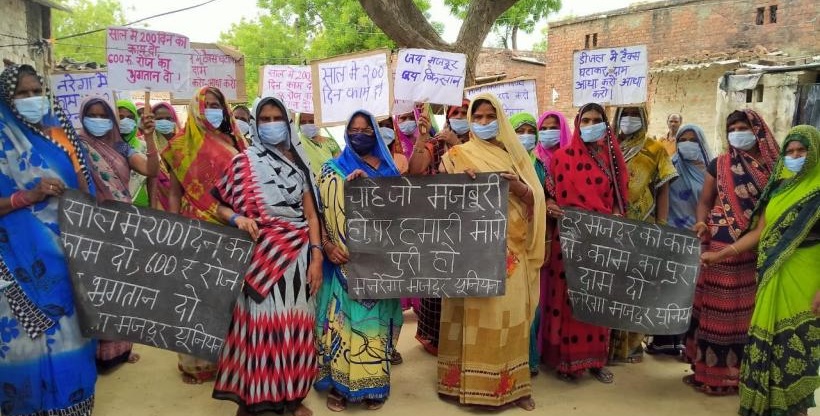Hundreds of thousands of farmers, workers and members of trade unions, student and women organizations observed a protest at thousands of places across India on Wednesday, May 26. The day marked the completion of six months of the historic farmers’ protest against the three contentious farm laws passed by the government of Narendra Modi. Farmers across India have opposed the laws, saying it will dismantle vital state regulations, reduce the price they get for their produce and lead to greater corporate entry in agriculture.
The day of protest was also held as the country reels under a second wave of COVID-19 with farmers criticizing the government for its failures on that front.
Samyukta Kisan Morcha – a collective of farmers’ unions – had called for observing the day at all protest sites at the entry gates of national capital, as well as in villages, towns and cities across the country while adhering to COVID-19 protocol. The farmers’ agitation, which began on November 26 alongside a one-day national strike by trade unions, saw tens of thousands camping on the outskirts of New Delhi where they continue to sit to this day.
On Wednesday, protests were marked by the burning of effigies of Prime Minister Narendra Modi and copies of the farm laws, while in other places, participants displayed black flags atop their houses, vehicles, shops, tractors, in their fields and at street corners.
In the State of Uttar Pradesh, several farmer leaders were put under house arrest ahead of Wednesday in order to curb the protests. Protests also turned violent in a few places in the State, when police launched attacks at the protesters in toll plazas.
Extending their solidarity, workers’ unions across the country, too, observed the day by hoisting black flags outside factories, commercial establishments and shops. Amarjeet Kaur, general secretary of the All India Trade Union Congress, said that the people can’t forget the agony of not getting beds, medicines, oxygen in their dire need and losing their near and dear ones to the claws of death during the pandemic. “They can’t forget the indignity meted to the departed and failure in assistance for cremations and burials. Hence the anguish is manifold. The result is that except for the coastal areas of Odisha and West Bengal, where Cyclone Yaas has hit, the day of protest was observed in every nook and corner of India,” she said.
In the Delhi region too, workers’ unions affiliated to the Centre for Indian Trade Unions observed the day at more than 50 places. Anurag Saxena, general secretary of CITU, said the enormity of the protest only suggests that people are miffed with this government as it has enabled unprecedented assault on employment opportunities to make the corporates wealthier.
At the Singhu border on the outskirts of Delhi, Gurjeet Kaur, a woman farmer who had arrived from Mansa district in Punjab, said the government was very much responsible of the violation of human rights of farmers when they had to face extreme conditions like winter and scorching heat just to press for their demands. “On the one hand, it is asking people to adhere to COVID-19 protocol whereas it is compelling people to sit on roads during the pandemic. This is nothing but sheer double standards on the part of this criminal government,” she said.
Gurmeet Mehma, general secretary of the Punjab State unit of Krantikari Kisan Union, said that the rising temperature will not deter the farmers who have already spent six months at the border. The site recorded temperatures above 35 degrees with extreme humidity on May 26. He said, “We are facing even greater heat with the government enabling large scale procurement of our land so that the corporates can build their silos and compensation is pittance. Once it repeals the three central laws, we have a whole lot of other issues to fight. So, essentially the fight will go on until this plunder is stopped and we are out of indebtedness.”
Major Singh Punnawal, All India Kisan Sabha Punjab’s secretary, said that the secular character of the movement is rattling the government and the ruling Bharatiya Janata Party and it remains the prime reason why they do not want to discuss these laws.
“We are getting this support from people everywhere only because we are right and defending the right of dignified life where a person does not have to beg for things as basic as bread and butter,” Punnawal said.
In the State of Uttar Pradesh, Brij Lal Bharati, general secretary of Uttar Pradesh Khet Mazdoor Union said, “We are not going anywhere and budge even an inch unless our demands to repeal the three laws are met. If the government wants us to go back then it should listen to us and roll back the laws. It is not our hobby to sit in the heat and the cold at the borders. We also want to go back home and be safe.”
In the State of Bihar, thousands of farmers, along with workers of different mass organizations of Left parties, observed the day of protest. Communist Party of India (Marxist) State secretary Avadesh Kumar said that farmers, trade union workers and members of different organizations of the party participated in protests in their villages, fields, houses, office and other places maintaining social distance in view of the ongoing COVID-19 pandemic.
CPI(Marxist Leninist)-Liberation State secretary Kunal said, “It was a rare day of protest amid the ongoing lockdown in Bihar. The protests have made it clear that farmers are against farm laws and they will continue to oppose it.” The Left parties and the main opposition RJD have demanded that the Bihar government pass a resolution against the farm laws and pressure the Center to repeal the laws.





